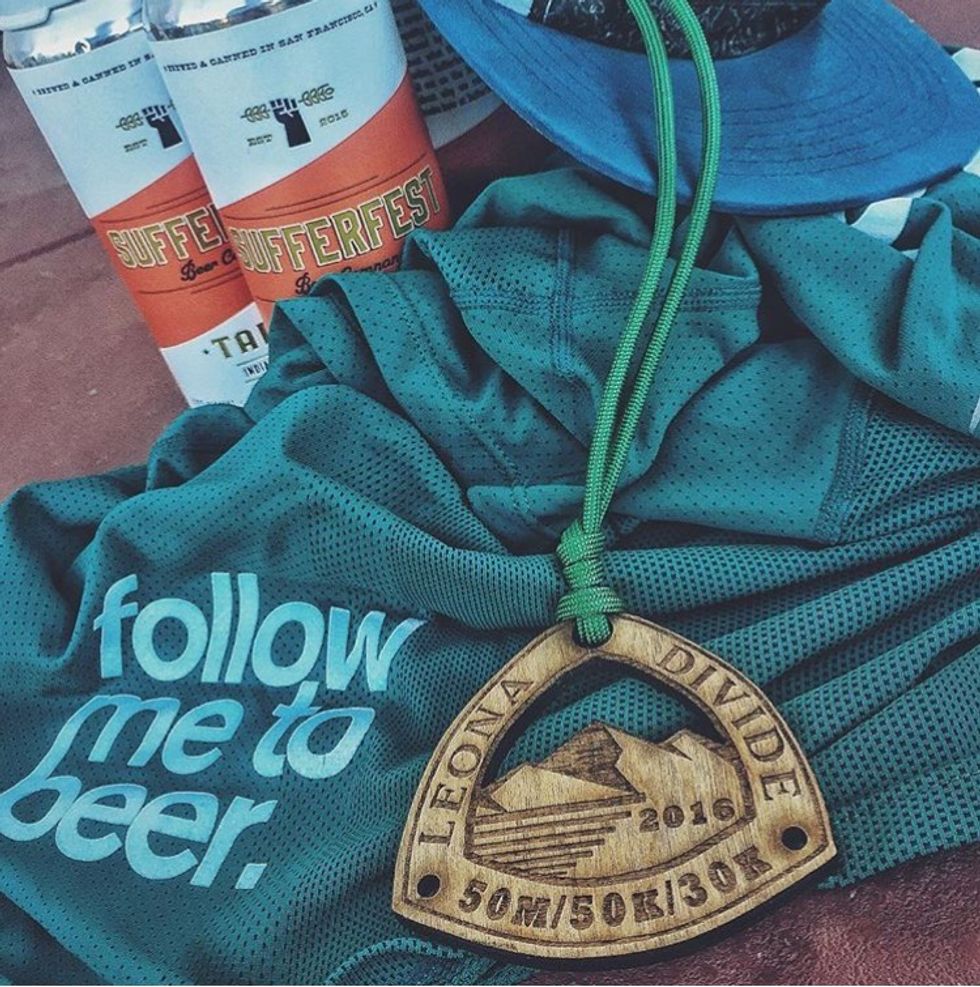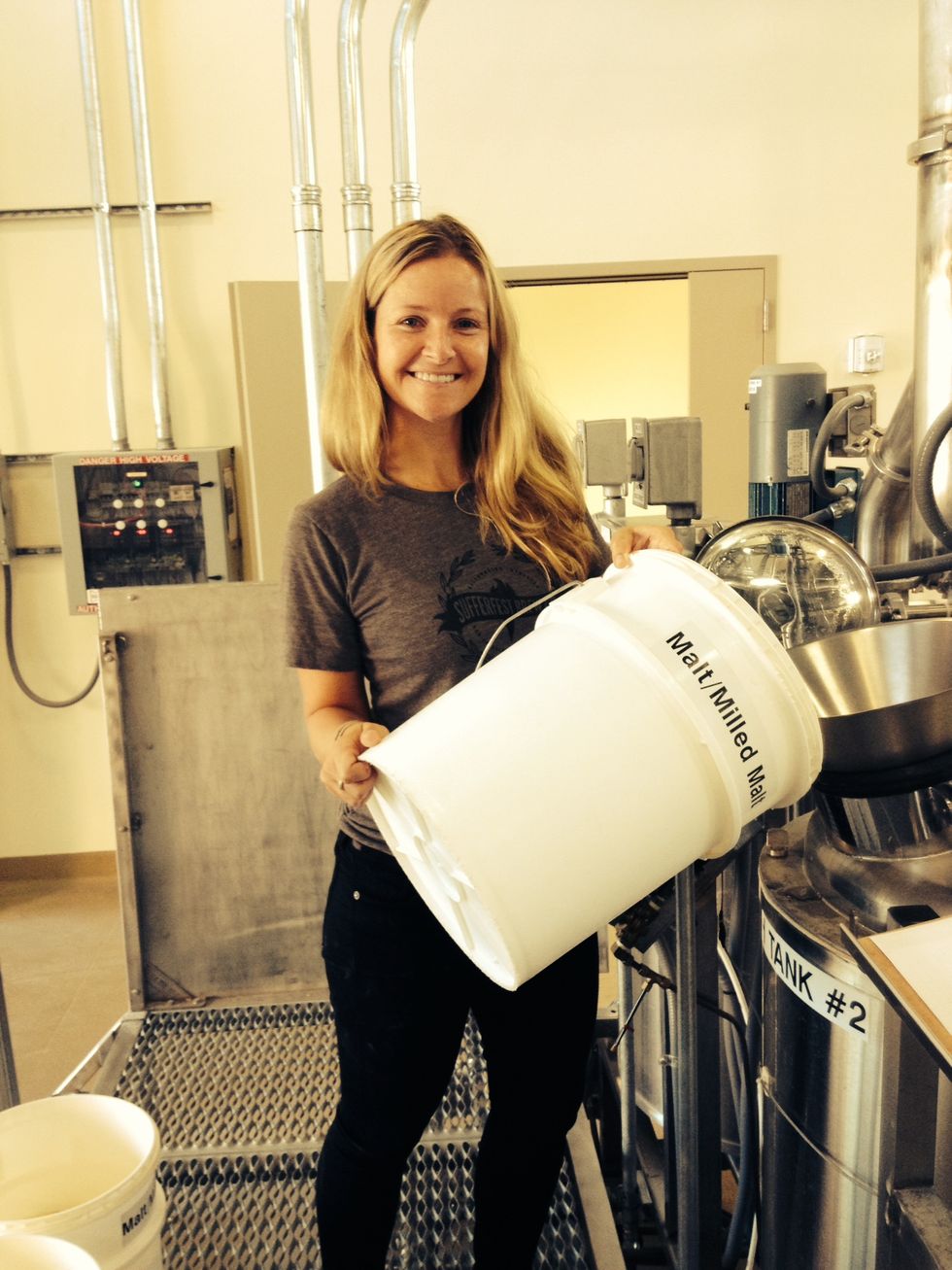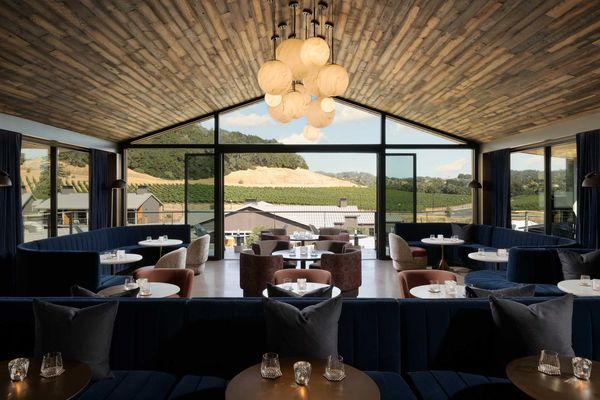If you've ever traversed 12 miles of obstacles and mud, run through electric shock wires, and come out the other side with a smile, you've experienced sufferfest. If you've pushed past "the wall" in a marathon, convinced you couldn't take another step, and felt the joy of crossing the finish line, you know sufferfest. And if you've ever struggled up a grueling hill, muddied and broken down, convinced the trail run you've signed up for is the worst thing you've ever done—and you can't wait to do it again? You're no stranger to sufferfest.
But it was a different kind of suffering that led Caitlin Landesberg to create Sufferfest Beer Company, a gluten-reduced brewery designed for athletes and named for those moments of post-race elation that come from surviving moments of extreme exhaustion to bond with your fellow participants.
A lifelong athlete, Landesberg was drawn to trail running and endurance events not only for the physical challenge, but for the feeling of accomplishment and comradery that followed her first race, the Double Dispea in Marin County.
"I remember ending that race and thinking, 'That was the worst thing I've ever done in my life—and I want to do it again,' " says Landesberg.
She continued to run and compete, but often felt sluggish and low on energy despite her healthy lifestyle. After becoming extremely ill during a middle-of-the-night Ragnar race from SF to Napa, Landesberg was rushed to a nearby emergency room, where the doctor realized gluten might be the culprit. In 2012, Landesberg was diagnosed with a gluten intolerance. And while the positive effects of experimenting with removing gluten from her diet were obvious ("It was like I had become superhuman. I was 30% more efficient in all aspects of life"), Landesberg often felt alienated during the same beer-fueled, post-race events that used to entice her to sign up for the events in the first place.
"Beer is part of a lot of sweating cultures, more so in running. You get your cold pint, and you sit around and talk about the sufferfest. And that's sort of the glue that binds us, this aftermath," says Landesberg. "I'd bring gluten-free beer or cider, but I was totally ridiculed."

So for her birthday ("and after enough complaining," she says), Landesberg's then boyfriend (now husband) gifted her brewing classes. She experimented with brewing sorghum-based beers and other gluten-free alternatives, but none of them tasted quite like beer.
"I made my first British ale and I was like, 'This is awful,' " she remembers. "But it actually wasn't that different than what was available. And I always had a little stash in my fridge that was mine, and I always called them Sufferfest. It was what we called it because it was my celebration—my little treat."
As an athlete, she took a competitive approach to brewing, commandeering her parents house in Healdsburg to tweak and refine recipes, eventually enrolling in summer courses at UC Davis. There, she was introduced to Brewers Clarex, an enzyme used for decades by big brewhouses for clarity and stabilization that also attacks the protein compound that can cause issues for gluten-sensitive people. Landesberg was able to make a full barley, malt-based beer.
"I was like, 'I'm making a real beer. This is so cool,' " she recalls. "I'm making a conventional beer like anyone else would."

After giving away bottles of this new type of beer to friends and racing buddies, Landesberg started to get bombarded with requests for the beer. But she realized the demand might expand past the athletic crowd at her wedding, when "everyone wanted the bride's brew," she says. After three years of homebrewing, Landesberg decided to take a leap of faith on opening her own brewery and making it her full-time job.
While she raised funding and spent months dealing with the red tape of owning and operating a brewery, she kept approaching local distributors and pitching her beers: the Epic Pilsner and a Taper IPA. The pilsner is light and bright but with some spice and a full-bodied feel. "It's a thin beer, but its got some body and some depth and some dynamism for a light light beer," says Landesberg.
The Taper, a West Coast–style IPA, is hoppy without being overpowering, with floral and pine resin notes meant to evoke hiking on the Dipsea Trail. "This is the beer for rest days. It's a good, chill sipping beer that has a nice kick at the end."
In March, Sufferfest officially launched with preorders and more than two dozen accounts, and in a little more than six months, has become one of San Francisco's best-selling beers, taking over shelves in local mainstays such as Bi-Rite Market and Whole Foods and BevMo! locations in the Bay Area. And while Sufferfest is a gluten-reduced beer, that's secondary behind Landesberg's main goal: to create a beer for athletes.
"I don't like being called a gluten-free beer. I like being called a beer for athletes," she says. "We just like to earn our beer and have a great tasting beverage that never lacks in quality or taste."
In that vein, you're most likely to find Sufferfest out supporting frequent trail running, cycling, and triathlete events, where athletes can frequently be spotted with the brewery's minimalist cans.
In addition to making a great tasting beer (gluten or no), Landebserg also has an eye on sustainability and the environment. She's not only looking at ways to source ingredients locally and make a product that has less of an impact on the environment, but Sufferfest is also a member of the National Parks Association and supports the Marin Agricultural Land Trust and Peninsula Open Space Trust.
"We're trail runners and cyclists and swimmers, so conservation of places where we run and play are really important," says Landesberg. "That's what we have to protect."

And while Landesberg already has her sights on a third beer to create a trio of year-round offerings, she doesn't plan on changing Sufferfest's original mission by expanding too quickly. Instead, she wants to focus on the brewery's loyal following and continue to alter the stereotype of the "typical" beer drinker.
"Changing the persona of the craft beer drinker is at the core of what I'm trying to do," she says. "This is the beer for people who care what they put in their bodies. They're not willing to shave off calories to have a piss poor beer. They want local ingredients, something really premium, and a brand they can get behind." // For stockists, visit sufferfestbeer.com





















